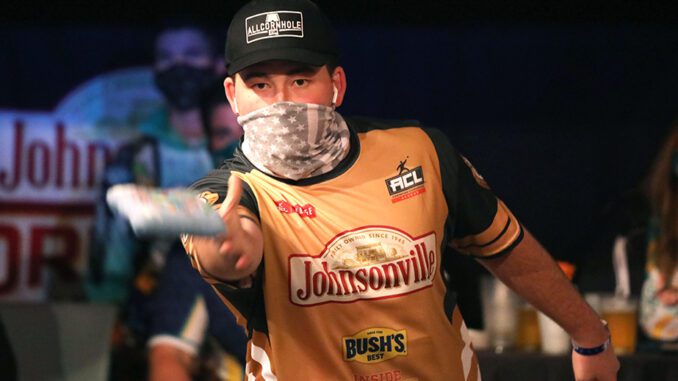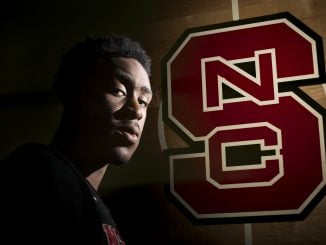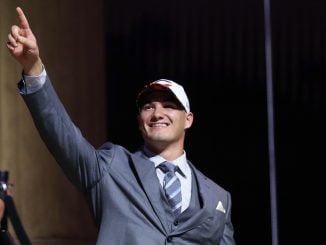
Draven Sneed fancied himself as the best cornhole player around.
And why not?
The NC State junior had always dominated games among family members and friends at backyard gatherings and tailgates before Wolfpack football games.
But he quickly learned that, as in all other sports, there’s a big difference in skill between even the best weekend warriors and serious competitors that perform at the highest level.
“Compared to everyone I played with, I won all the time, so I just thought I was really good,” Sneed said. “I wasn’t really competitive until I went to a blind draw tournament last year and played against some really, really good players that beat me bad.
“It was a shock when I went to that blind draw. It forced me to want to get better at it.”
Calling on the work ethic he learned while serving in the Army and challenging himself against more accomplished opponents, Sneed didn’t just get better. He actually did become the best cornhole player around.
It’s a title he secured in Myrtle Beach on Dec. 29 when the 24-year-old Cherryville native won the collegiate title at the American Cornhole League College National Championships.
The third-seeded Sneed was a perfect 12 for 12 in the final against Ryan Fillingam of Texas’ Blinn College to secure the victory and the $25,000 in scholarship money that went with it. He and State teammate Alex Lippard also made it to the championship match of the doubles competition before falling to a duo from Auburn to settle for runner-up honors.
“Once you get started going well, you start feeling it,” Sneed said. “You get in a zone and everything just feels like you can do whatever you want.”
His performance in the singles final was especially impressive since the match was broadcast to a national audience on ESPN.
But it was nothing out of the ordinary as far as his doubles partner is concerned.
“It was something I’d seen before,” Lippard said. “But for the people watching and to do it on that stage was pretty amazing because I knew I was not going to be able to do it on that stage.”
Competitive cornhole is the same game as the one played in the parking lots at Carter-Finley and virtually every other college football stadium around the country on fall Saturdays. The object of the game is to get more bean bags into the hole cut in the middle of a slanted board situated 33 feet away.
In addition to the college division, there’s also a professional tour. Stacey Moore, the founder and commissioner of the American Cornhole League, is hoping that cornhole will someday become an Olympic sport.
It’s a pursuit that proved perfect for Sneed after his left leg suffered significant damage during a training jump while a member of the 82nd Airborne stationed at Fort Bragg in 2016.
“I’ve got two plates, two screws and nine (bolts) in my left foot,” said Sneed, who played basketball and golf at Cherryville High School. “It still hurts and gets worse every now and then. But I’ve learned to deal with it.
“Basketball is a little tough these days and golf is still doable, but cornhole is very low impact. It’s nice to go out there and stand still most of the time.”
Sneed enrolled at State after receiving a medical discharge from the Army. Not only is he an accomplished cornhole player, but he also serves as president of the university’s Student Veterans Association while pursuing a business degree with an emphasis on finance.
It was through his connection to the Wolfpack that he met Lippard.
A sophomore agriculture major from Statesville, Lippard had wanted to play in the national tournament since seeing the event on television while still in high school. But he didn’t want to go until he could find an accomplished doubles partner.
Sneed, on the other hand, only began thinking about nationals after teaming up with Lippard.
“They play every night down here pretty much and I met up with Draven,” Lippard said. “I knew that if I was going to NC State and I wanted to play in this (national) tournament, I needed to find somebody that also went to NC State. The deck of cards just fell perfect for us because we’re both thrilled to play with each other.”
Sneed is equally as thrilled to be representing the Wolfpack, especially since his nationally televised success has brought some positive attention to a school that hasn’t had a lot to celebrate in recent years.
The only national championships State has won since Jim Valvano’s men’s basketball team upset Houston to cut down the nets in 1983 have come in bass fishing and Ultimate Frisbee.
“We’re not so good at the big sports, but we’ve got the little ones,” Sneed said, adding that his title fits right in with the perception many have of his school. “There’s been a lot of people saying, “It figures State is good bass fishing and cornhole.’ It’s all over the internet. It just feels good to win for State. I love State.”
Because cornhole, like bass fishing, isn’t a varsity sport, it’s uncertain if Sneed’s victory will be officially acknowledged by his school. Athletic department spokesman Fred Demarest said that in-game presentations are currently on hold because of coronavirus protocols.
While Sneed isn’t expecting an elaborate ceremony to commemorate his accomplishment, he said some kind of recognition would be nice.
Perhaps something fitting, like a championship banner hung in view of all the other cornhole players in the parking lot of Carter-Finley Stadium
“That would be pretty cool,” he said. “I’d be all for that if they’d want to do it.”



